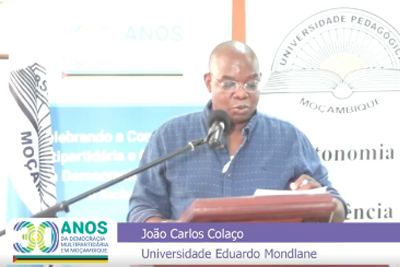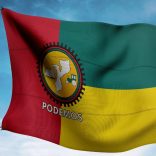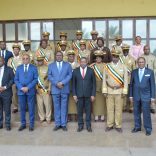Mozambique: Court upholds request to halt second round of elections in Podemos
Mozambique: Democracy must be based on our culture – Stela Muianga

Stella Rosa Muianga, Professor of Philosophy at the Pedagogical University, says we need to think of a democracy which starts from the base up, that is, which is based on our interculturality, and establish an elision between multi-partisanship and local culture.
Muianga says that we need to think of ourselves starting from ourselves and think of models which lead to our well-being and solve our problems.
“In this sense, we must think about disobedience to democracy thought in the Western moulds, if not of non-democracy should we wish to think, with [Kwasi] Wiredu, about the non-partisan model. When Wiredu talks about non-partisanship, it is in the sense contrary to the idea of parties which has at its centre the basic idea of a democratic majority,” said Muianga, stressing that when referring to the issue of non-partisanship, Wiredu says that there will be different groups, by origin, by difference of ideas. But these are not based on the appropriation of power, and here she underlines the idea of cooperation and of non-confrontation.
For Muianga, this is not to be confused with the idea of a single party. In the single party, nobody loses because the whole party wins. In non-partisanship based on traditional African societies, no one loses because there is a natural sharing of power, or simply because there are no parties and there is an implicit participation of everyone based on dialogue and interculturality; no-one is excluded.
“And more than a multiparty democracy, criticism, dialogue and inter-culturality are necessary conditions for an effective democracy which has at its core the idea of inter-partisanship. And more than on inter-partisanship; we need to think about more inclusive governance models which are based on the African and perhaps on the possibility of non-partisanship,”she stressed.
Muianga, the multiparty system should reflect the greatest possible diversity, in order to reach a more representative consensus, of more groups with different interests, which is well described but not effective in practice.
“Mozambican democracy is simply formal, but deficient in its implementation. In order to guarantee a true democracy, which is not just formal, more space must be opened up for the exercise of individual freedoms,” the philosophy teacher explains.
The debate on dialogue, criticism and interculturality in Mozambique was organised by the Institute for Multiparty Democracy in coordination with Ethale Publishing, a publisher dedicated to promoting African literature, culture and thought. It aimed to reflect on the role of dialogue, criticism and interculturality as concepts to be taken into account for the promotion and consolidation of democracy in Mozambique.
The meeting was attended by national personalities representing various academic institutions, deputies of the Assembly of the Republic and representatives of political parties as well as the media and members of civil society.
At the meeting, Professor João Carlos Colaço, from Eduardo Mondlane University, said that the 30 years of democracy in Mozambique were characterised by several challenges which reinforce the need for reflection on the issue of cohabitation and plurality of ideas – not in the sense of everyone agreeing with everyone but in the sense of sharing ideas, which will make the debate not a conflict but a meeting point for different views.
For Professor Colaço, multiculturalism guarantees respect for differences and a multipolar view of power and “will recognise differences in order to guarantee the expression of the different cultural entities which exist in Mozambique, as well as guarantee spaces in which they can be expressed”.
“Interculturality recognises the existence of a vision which is no longer monolithic, but multipolar, where there are possibilities of cohabitation of the respective differences for the construction of an inclusive democratic society,” Colaço said. The triumph of democracy and multiculturalism can only be achieved if we take cultural and political diversity into account as a central factor of Mozambican society, and conflict as something inherent in the democratic order, he added.
Colaço explains that it is based on this diversity that our socio-cultural and political relations must be permeated and structured, making dialogue and criticism an imperative for national reconciliation and the cohabitation of cultures and political views.














Leave a Reply
Be the First to Comment!
You must be logged in to post a comment.
You must be logged in to post a comment.